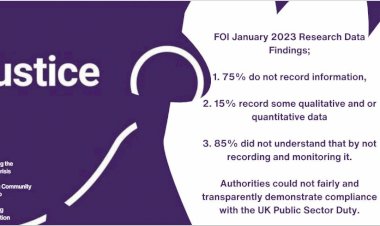BREAKING THE SILENCE: 4 IN 5 WOMEN REPORT WORKPLACE SEXISM IN FOOTBALL
Women in Football survey exposes lived realities and urges the game to match women’s resilience with real accountability.
69% of men believe women must work harder than men to receive the same recognition and benefits. The figure rose to 86% for female respondents.
78% of women have experienced discrimination based on their gender in the workplace. Over half of women reported experiencing sexism or misogyny.
Discrimination, online abuse, career progression obstacles, and a lack of support adversely impact a higher percentage of women in football from underrepresented ethnic groups.
Nearly 4 in 5 remain optimistic about the prospects for women in the football industry. Women in Football’s fifth annual industry workforce survey results, released today, highlight three
indisputable realities for those working in the game:
Discrimination is persistent and widespread
Systems for reporting discrimination are ineffective
Workplace culture is a significant barrier – a factor recognised by more than two thirds of
male respondents
And the data from respondents of ethnic origins underrepresented in the industry unequivocally demonstrates that football's diversity problems run far deeper than just gender. There are institutional barriers which go beyond individual behaviours, which highlight systemic exclusion.
Despite the manifold challenges, respondents express some optimism. Current gaps can represent clear opportunities, and with an increase in online discrimination encountered by both men and women, the industry has an opportunity to unite in tackling a growing daily scourge which is the lived reality for not only players and coaches but football administrators and executives too.
Women in Football CEO Yvonne Harrison said:
“The headline data from the 2025 survey remains relatively static, and in many areas, bleak. They are not just numbers: they are the lived experiences of people working in the game, and they deserve better. If the industry is to change, we need to recognise these hard truths. We can safely assume that the real levels of discrimination are even higher, with a third of female respondents stating they had not reported incidents due to a lack of faith and trust in workforce processes, or for a fear of retribution.
“We cannot keep relying on the resilience of women. We need women to be supported, valued, and recognised. These are not questions of cost. It is a question of culture, and a commitment to ensuring psychological safety.
“WIF remains steadfast in its belief that a more diverse workforce is a better workforce which the whole game benefits from. We are determined to continue working with our industry partners across the myriad topics highlighted by our survey to support more organisations to move towards becoming truly gender-inclusive employers. With women’s voices informing solutions, and men being an active part of the conversation, demonstrating true allyship in action.”
Earlier this month, WIF’s Equity, Equality, Diversity, and Inclusion Advisory Group met for the first time, a recognition of how, through a deeper awareness and understanding of intersectionality, WIF can work with football’s stakeholders to lead change. From governing bodies, leagues, and clubs, to broadcast, commercial and media partners, WIF will drive positive change and challenge discrimination. WIF will also continue to be an active sparring partner, convener and supporter to the government, Parliament and Ofcom in relation to evolving legislation such as the Online Safety Act and Employment Rights Bill.
Ebru Köksal, Women in Football Chair, said:
“This year’s findings provide us with the evidence to both confront discrimination and celebrate progress. They also show that barriers are often higher when gender intersects with other underrepresented identities, reminding us that intersectionality must inform real solutions. Women in Football will continue to work with the industry to break down these barriers and ensure the game becomes inclusive for every woman. Together, we can turn evidence into action, and action into lasting, systemic change.”
SURVEY HEADLINES
Discrimination
78% of women have experienced discrimination based on their gender in the workplace.
63.5% of women experienced sexist banter/jokes.
Over 56% of women working in football said no action was taken after reporting gender-
based discrimination in the workplace.
Non-reporting and psychological safety
36% of female WIF members did not report cases of abuse or discrimination as they didn’t think anything would be done about it. 34% of female WIF members did not report cases of abuse or discrimination as they did not trust the process, or people handing the
case. 26.9% did not report cases of abuse or discrimination as worried it would affect their career.
Online abuse
76% of all female respondents say that the levels of discrimination they have witnessed online have increased or stayed the same. 71% of male respondents reported the same.
81% of women from underrepresented ethnic origins say the levels of discrimination they have witnessed online have increased or stayed the same.
Obstacles, visibility and recognition
86% of women working in football believe women have to work harder than men to achieve the same recognition and benefits. 69% of men agree with them.
68% believe male dominance was the biggest challenge for women in football.
56% cite unconscious bias as a one of the biggest challenges, jumping to 75.6% for women
of underrepresented ethnic origins.
50% of women have not had access to training to support their development, such as
career development planning, mentoring or training to support upskilling/career transition.
Just 12% of all women, and 10% of women from underrepresented ethnic origins, strongly
agree that their work is acknowledged or celebrated.
Contributors to women’s success in football
67% of WIF members believe their resilience and 63% their determination has helped them throughout their careers in the football industry.
Levels of optimism
While levels have reduced, they remain positive, despite the prevalence of some challenging stats:
77% of women are optimistic about the prospects for women in the football industry.
55% of women said the football sector is one where women can excel – but for women of
underrepresented ethnic origins, this drops to 29%.
The survey data was analysed by Upshot, a fully registered community interest company.
867 (759 women, 100 men and 8 non-binary) people responded to the survey
12% of respondents are from underrepresented ethnic groups
71% of respondents are in full-time work
65% of respondents are under the age of 45
14.6% of respondents are executives, CEOs or directors
16.8% of respondents are in entry-level positions

























